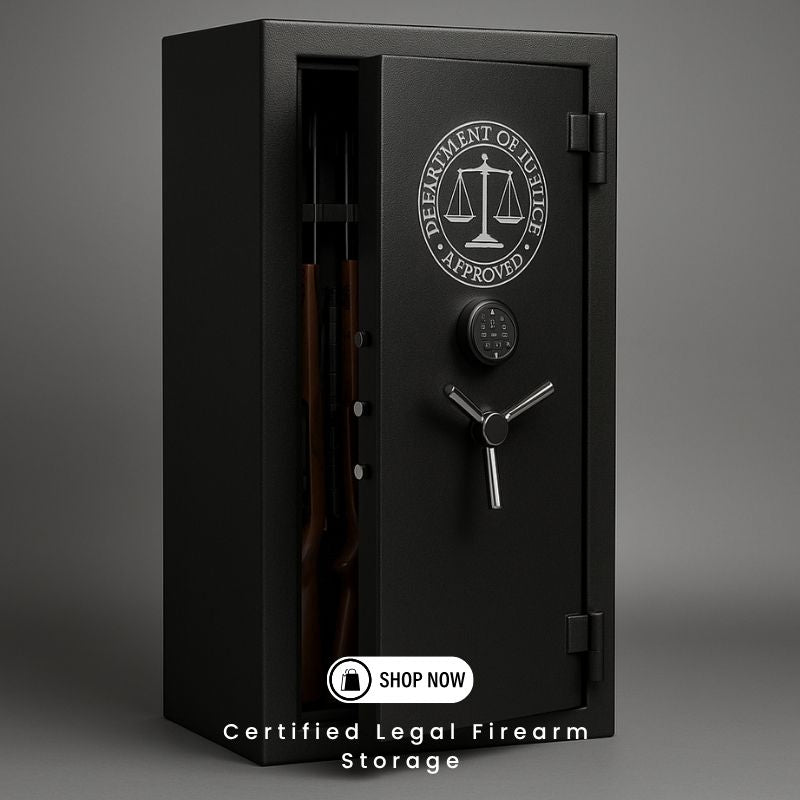When you’re investing in a safe, you’re not just buying steel and locks — you’re buying peace of mind. But peace of mind only comes when your safe meets the legal requirements for your state, industry, or intended use. At Vanguard Safes Co., we make sure every safe we sell complies with all applicable regulations so you can buy with confidence.
In this post, we’ll break down the key compliance laws and certifications you should understand before choosing your safe.
Why Compliance Matters
Choosing a compliant safe isn’t just about avoiding legal trouble — it’s about ensuring your valuables, firearms, or sensitive documents are stored under conditions proven to protect them.
A compliant safe means:
-
You’re meeting state and federal laws for firearm storage.
-
Your safe has been tested and certified by independent labs.
-
You’re eligible for insurance benefits in case of loss.
The Big Four Compliance Standards You Should Know
1. DOJ Compliance (California Department of Justice)
California has some of the strictest firearm storage laws in the U.S., and many states reference its standards. A DOJ-approved gun safe must meet specific requirements for construction, locking mechanisms, and tamper resistance.
Why it matters: Even if you don’t live in California, a DOJ-compliant safe meets a high benchmark for firearm security.
2. Fire Resistance Certifications (UL & ETL)
UL (Underwriters Laboratories) and ETL (Intertek) are independent labs that test safes under extreme fire conditions. Common ratings include:
-
UL 350: Protects paper documents by keeping the interior below 350°F.
-
UL 125: Protects electronic media by keeping the interior below 125°F.
-
ETL equivalents are often accepted as comparable.
Why it matters: Insurance companies and risk assessors often require certified fire resistance for document and data storage.
3. Residential Security Container (RSC)
An RSC is a safe tested to withstand a 5-minute attack using common hand tools. It’s the baseline burglary resistance certification for home safes.
Why it matters: Many firearm storage laws require at least RSC-level protection to prevent unauthorized access.
4. State-Specific Storage Laws
In addition to federal guidelines, states often have their own rules for firearm or sensitive document storage. For example:
-
Some states require a minimum weight or bolting of safes.
-
Certain states mandate trigger locks or storage devices alongside the safe.
- Businesses handling sensitive records may be subject to data protection storage laws.
-
Why it matters: Non-compliance can result in fines, liability, or even loss of licenses for businesses.
How Vanguard Safes Co. Keeps You Compliant
We take the guesswork out of compliance by:
-
Sourcing only from authorized, certified manufacturers.
-
Clearly listing UL, ETL, and DOJ ratings on product pages.
-
Staying current on state-by-state storage laws.
-
Offering expert consultations to match you with the right safe.
Quick Buyer’s Checklist for Compliance
Before purchasing, confirm that your safe:
✔ Meets or exceeds your state’s firearm storage laws.
✔ Has valid UL or ETL fire certifications.
✔ Is DOJ-approved if used for firearm storage.
✔ Is appropriate for your intended use (home, business, data storage).
Need Help Navigating Compliance?
You don’t have to read through pages of legal code — that’s our job. Contact our U.S.-based team, and we’ll help you choose a safe that’s both secure and compliant for your situation.

